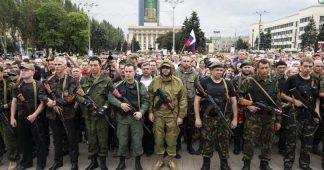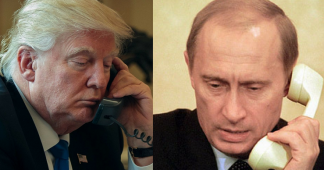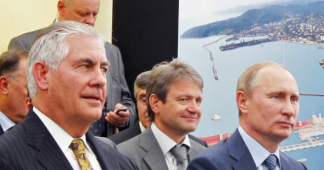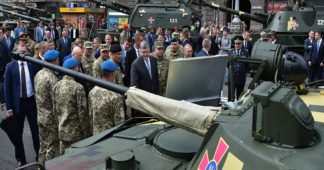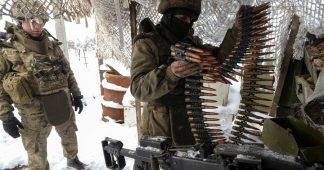by Tyler Durden
Fri, 07/20/2018
Perhaps Putin didn’t get the memo that democratic referendums don’t count unless the people can be counted on to vote “the right way”? And perhaps Trump is not actually doing Putin’s bidding?
A day after President Vladimir Putin told Russian diplomats in a closed door meeting that he set a proposal before Donald Trump during their Helsinki summit that a resolution to the crisis in eastern Ukraine could be reached by holding an internationally monitored referendum in contested separatist regions, the White House has for the first time acknowledged it.
In comments reported Friday by Bloomberg, a spokesman for the White House National Security Council indicated Trump has rejected the plan, saying “The administration is not considering supporting a referendum in the eastern Ukraine.”
“The Minsk Agreements are the process for resolving the conflict in the Donbas, and these agreements do not include any option for referendum,” the White House spokesman said in reference to the 2015 European-brokered truce deal which ultimately calls for full Ukrainian government restoration of control over the state border and throughout the conflict zone. And added, “Furthermore, to organize a so-called referendum in a part of Ukraine which is not under government control would have no legitimacy.”
Rebel coalitions in Donetsk and Luhansk held referendums on independence in May of 2014 which resulted in many towns coming under the control of the self-proclaimed Donetsk and Luhansk People’s Republics; however the vote was rejected internationally with Kiev dismissing the move as a “farce”. Kiev has pushed a compromise of offering the war-torn region some degree of autonomy while remaining under the Ukrainian state.
Four years of fighting between pro-Russian separatists and Ukrainian government troops have resulted in over 10,000 people killed and more than one-and-a-half million displaced.
This report from @NPR – that NPR, not Fox – points out what the self-serving cable and Twitter hysteria will never mention: despite the rhetoric, Trump's *policies* toward Russia have been combative, belligerent and provocative (which I think is bad) https://t.co/fjSGfl59Yv pic.twitter.com/NqAIH5sWe2
— Glenn Greenwald (@ggreenwald) July 20, 2018
Thus far, much of the policy content that is rumored to have been discussed between Trump and Putin during their two hour one-on-one session in Helsinki on Monday has been kept tightly under wraps, with more description of what was considered coming from the Russian side.
On Thursday when news first broke of the proposal, which reportedly involved Putin agreeing not to publicly disclose the plan in order to give Trump time to consider it, The Hill summarized what little that could be gleaned as follows:
The proposal reportedly calls for a vote in separatist regions of the country that would allow the areas to decide their own status as a way to resolve the ongoing conflict in eastern Ukraine.
…Such a referendum would almost certainly face intense pushback from Kiev and the European Union, which remain supportive of the 2015 Minsk II agreement to halt the fighting in Ukraine’s Donbas region.
It would also mark a change in Washington’s position, which calls for Russia to live up to its commitments under the Minsk agreement.
Or we could translate this more simply as given that some three quarters of the Donbas region identify Russian as their main language, and with Western media reports long acknowledging the multiple polls suggesting the majority in the region reject the EU/US-backed government in Kiev, a referendum on the future of the contested remains unconscionable for the Western alliance.
On Thursday Trump tweeted that his meeting with Putin was “a great success” and separately cited Ukraine among the areas discussed, but without providing details. Since Monday’s summit, Putin has warned of “serious risks of an escalation” in fighting in eastern Ukraine while also telling Russian state television he and Trump discussed “new ideas about ways of regulating the conflict in Ukraine”.
“We agreed to work on this for now on the expert level. In my view, this is a positive element of movement forward,” Putin said.
Kiev has this week also been seeking clarification of what was discussed at Helsinki. Western and NATO leaders have shown heightened concern over potential future White House policy after last month Trump reportedly told fellow G7 leaders that the Crimean peninsula was part of Russia “because everyone there speaks Russian” (in reference to Russia’s 2014 annexation of Crimea).
Though President Trump has been hounded by accusations of “treason” and “collusion” more than ever before in the wake of his controversial closed door meeting with his Russian counterpart, NPR on Friday seems to have deflated one of the key ‘Russiagate’ talking points bolstering this narrative.
In a rare moment of honest mainstream media commentary in response to Trump’s telling reporters on Wednesday, “There’s never been a president as tough on Russia as I have been,” NPR pointed out an obvious truth that’s long been missing in the mainstream:
That might sound like hyperbole, but in this case, there’s actually some basis for the president’s boast.
“When you actually look at the substance of what this administration has done, not the rhetoric but the substance, this administration has been much tougher on Russia than any in the post-Cold War era,” said Daniel Vajdich, senior fellow at the Atlantic Council.
This of course includes Trump’s consistently ramping up arms sales to Ukraine, increased sanctions on Russia, and aggressively lobbying NATO member countries to increase defense spending, among other measures.
